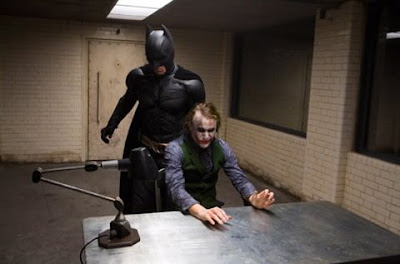One of my favourite books and films, and prescient too – but this is funny.

One of my favourite books and films, and prescient too – but this is funny.

Excellent in lots of different ways. 4.5/5
The trouble with the Joker as a villain – and Heath Ledger is remarkably good in this, much better than Nicholson, and he wasn’t bad – is that he outshines Batman himself. I wouldn’t have rated this so highly if we didn’t have Batman Begins to fall back on.
NB the sound at the Odeon cinema in Colchester was not as good as it might have been. There were various elements of dialogue that I missed. I look forward to getting my own DVD copy and rewatching it. Once or twice…

This is a sketch for a much longer essay about science fiction. Click ‘full post’ for text.
One of the dominant themes of Modern culture is the Frankenstein conceit – what you might think of as the ‘mad scientist’, or, more profoundly, the Faustian bargain. A man (and it normally is a man) is so consumed by his rational intellectual pursuits that he unwittingly provokes disaster and his own death.
As I see it, this is the way in which humanity’s soul has digested and absorbed the impact of the Enlightenment. The Enlightenment project is precisely that which has elevated one element of our human nature falsely above the others; it has insitutionalised asophism; and thus we are in the midst of ecological crisis. The devil has come to collect his due.
Being a fan of sf, especially visually, I am struck by the way in which this theme has been subverted and then overcome within the world of fiction and film. I see this as a creative analogue of the way in which the Enlightenment project has itself been undone from within. (This is, I believe, why there is such an efflorescence of angst-ridden writings from the humourless atheists like Dawkins and Hitchens et al – they are aware in their bones that they are being left behind.)
Three examples of this shift:
1. The Matrix trilogy. The first Matrix was pure Frankenstein – the intellectual products of humanity turn against their creators and destruction follows; human liberty and salvation lie in battling against the machine. However, the second two films explored something more creative – the machine is not monolithic, it has variety (and therefore more dramatic interest of course) – there is a possibility of an alliance between human and mecha.
2. Battlestar Galactica, the new series. Whereas in the original series we are facing highly efficient automata (rational products of Enlightenment) now the cylons are riven with their own competing needs and desires. The Cylons are now just like us; we can even breed with them.
3. The Sarah Connor Chronicles. The original Terminator film is a real classic, and a classic description of the Frankenstein – a totally remorseless source of death and destruction ‘it absolutely will not stop until you are dead’. With the films a little first, but now much more with the series, we have much more creative ambiguity. This crystallised for me in the recent episode where Summer Glau starts to learn ballet. A vision of beauty – and whether it is human or mecha falls by the wayside.
(I’ve also been put in mind of this by recently finishing Dan Simmons’ Hyperion cantos, but I’ll write about them separately.)
I believe that what we have in this medium – film and television science fiction – is the creative resolution of the human conflict created by the Western idolatry of reason. As our society moves beyond the Enlightenment, so too does our fiction. Robots who are pure products of reason are no longer very interesting – the robots need to have more to them – and this is simply a mirror for how we see ourselves. In other words, there is more to humanity than the remorseless application of reason.
I find this encouraging and exciting.

Didn’t engage me as much as the previous one. Good fun though. And I am undoubtedly not worthy to pass comment on someone as awesomely gifted as Moore is.
In other words, if you haven’t read Watchmen yet, you’re not living in the contemporary world. Make sure you read it before the film version comes out….

This was a really enjoyable graphic novel: Superman lands in the Ukraine rather than Kansas and grows up to be the dictator of the Soviet Union – and then the world. I tend to find Superman quite a dull hero, but this altered perspective really helped to explore the character/ archetype, as well as some good political themes. Excellent twist ending as well. Recommended.

Scott McCloud‘s sequel to ‘Understanding Comics’, which was very interesting, particularly the potential integration with the internet. One of those books that just opens up whole new fields of inquiry for the reader.